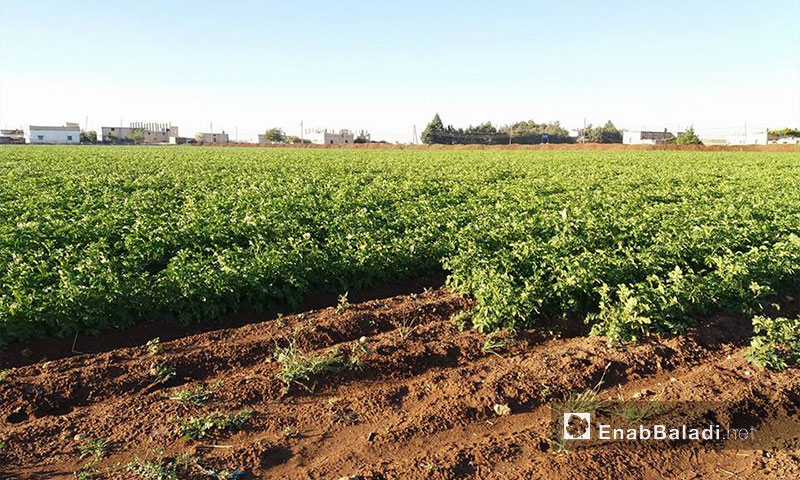Enab Baladi – Aleppo Countryside
A number of institutions and organizations that specialize in development and agriculture have been working to repair the “crack” that has affected the agricultural sector in Syria because of the war. Some of their strategies include the implementation of developmental projects that aim at achieving self-sufficiency and providing some basic services to local farmers that shall make local markets capable of meeting their requirements independently from foreign markets.
Referred to as “the biggest agricultural project in Syria”, the General Organization for Seed Multiplication, GOSM, together with the local council of Marea city in the north of Aleppo, have launched a project for the production of local seed potatoes. This action was undertaken to help the Syrian farmer and reduce purchasing power in the region by means of agricultural land leases along the Marea Hur Al-Nahr road.
The project includes 60 net houses, where the five popular potato varieties, namely, Banella, Jelly, Krone, Riviera and Agila, are cultivated in the villages of the northern and the eastern countryside of Aleppo.
Twice as Cheap as the Imported Ones
One of the first implementation phases had started last February and cost more than $ 85,000. The project aims at producing 1200 tons of seed potatoes to secure the cultivation of 60 hectares of Aleppo countryside land.
Maan Nasser, GOSM northern office director, says that “the first and foremost goal of the project is to provide the local market with seeds for a price which is commensurate with the income of the city farmers, equivalent to 500$ per ton of seed, rather than relying on import from a foreign market which costs 1800$ per ton.”
The director explains that the project will be the mechanism wherewith self-sufficiency and price balance can be achieved, besides providing enough quantities of potato as it represents one of the most important food commodities in the region.
The production of a single net house is estimated to be 2.5 tons of seeds, which means about 120 tons of total production of all varieties. According to Nasser, “the quantity produced is enough to cultivate 60 hectares and capable of producing the expected quantity of 1700 tons of potatoes.”
According to the director, GOSM has worked on broadcasting the net houses with organic fertilizers and spraying them with chemical composts and employing drip irrigation for the purpose of obtaining an excellent quality of crops.
“The project executed in the region could contribute to the increase of local potato production and push farmers and people of the area to expand the cultivated areas,” said Abdul-Rahman Mohammad, a farmer from the northern Aleppo countryside.
He explained to Enab Baladi that the common price of “Sunray” imported seed potatoes in the region varies between 1200 to 1800 dollars per kilogram, as opposed to the new price of seed produced by the new project ($ 500), which means that the price was almost cut to quarter.
The farmer stressed the secondary charges that are usually added to seed prices and that affect the farmer’s ability to go on with his cultivation. These are mainly related to irrigation, for the cultivated seeds need huge quantities of water on a daily basis, added to the very “expensive” fertilizers and chemicals that are vital for increasing the production.
An Estimated Quantity Equivalent to Half of Jordan’s Production
GOSM was formed in 2013, and it is the first administrative and institutional entity in the opposition areas. Its main role is to distribute seeds to farmers and provide them with encouraging and acceptable prices, especially those of wheat and potatoes. To encourage citizens, the organization often offers subsidized prices which are lower than market prices.
In the same context, the director of the Office of Agriculture in the local council of Marea Abdul-Rahman Baqur said that “if we take into consideration the quantities the project is expected to produce they might be equivalent to half the production of the State of Jordan compared to the production of neighboring countries.”
He further explained to Enab Baladi that “the project is expected to achieve its primary goal of self-sufficiency”. He also pointed out that “coordination and cooperation are still unremittingly proceeding between GOSM and the Office of Agriculture in the local council with the utmost care and engagement”
The reality of agriculture in the northern and eastern countryside of Aleppo has changed in a very negative and drastic way during the past months before the expulsion of ISIS from the area, and this did not happen without contaminating the quality and value of the crops. The post-liberation absence of any regulating and operating authorities, notably the transitional Syrian government, made the situation even worse.

